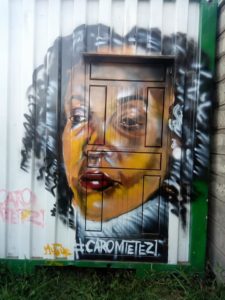Minds of the Movement
An ICNC blog on the people and power of civil resistance
by Julius OkothMarch 14, 2019
In the space of just a few days in February, Kenyan human rights movements reached stage five of social movement theorist Bill Moyer's Eight Stages of Social Movements: a widespread perception of failure among activists, exacerbated by negative media coverage and, in turn, participation in movement events.

A tribute to human rights defender Carol Mwatha. Source: Dandora Social Justice Centre's Facebook page.
The downturn began with the tragic death last month of grassroots activist Carol Mwatha, who succumbed to excessive bleeding following a botched abortion. Kenyan media propagated the narrative of Carol’s abortion, shifting the focus away from Carol’s and Nairobi-based justice centres' grassroots work to put an end to extrajudicial killings (killings, often state-sponsored, that were not sanctioned by legal proceedings). For many years, organizations like the Mathare Social Justice Centre have been committed to monitoring, documenting, and reporting extrajudicial killings, especially femicide, in Nairobi’s informal settlements.
This was a direct attack on the human rights movement and its continuity, shifting the public discourse to abortion, which is an illegal practice and taboo subject in Kenya due to the Christian conservative majority. The abortion narrative put the movement on the defense, forcing it to deal with humiliation, shame, and social polarization, instead of staying focused on its nonviolent struggle to end extrajudicial killings.
But the movement is now picking up the pieces and finding ways to bounce back from the harmful narrative.

Ruth Mumbi, an internationally recognized Kenyan human rights activist. Source: The Nairobi Side Hustle.
In the past few weeks, activists have been changing focus. Internationally recognized human rights activist Ruth Mumbi and other Grassroots Womxn are mounting a reproductive health rights campaign, which aims to increase the movement’s legitimacy, power, and tactical repertoire. They are aiming to turn the abortion debate into a class issue. In Kenya, as in many other countries, there is a disparity between rich women, who can afford to go to qualified gynecologists and the best hospitals to get safe abortions, and poor women, who risk their lives in back-alley clinics. Absurdly, when the rich get abortions, it is not considered a crime, but the poor are subjected to legal jeopardy and character smears when they do so.
Various grassroots feminists in Kenya are now calling for good-quality and free abortion services for all. They are raising awareness about the failing public health system, pointing to Carol's death as proof that such a system propagates unregulated and unaccountable private clinics in poor neighborhoods—with deadly consequences. Further, groups are demanding sex education, as well as access to various forms of contraception.
Making Oppression Backfire
This episode made me recall “backfire” as a topic that, admittedly, I took for granted during my fellowship with the International Center on Nonviolent Conflict in 2016. I was compelled to go back to my library and read Making Oppression Backfire by Srdja Popovic and Tori Porell, and to re-examine Backfire Manual: Tactics against Injustice by Brian Martin. In revisiting these texts, I was reminded that, as Martin’s model suggests, “taking stigma back to the oppressor” can be an effective reaction to injustice. By using Carol's death to draw attention to the failures of Kenya's health system and other reproductive justice issues, we hope to achieve just this.
In the fourth century BC, the Chinese military strategist Sun Tzu said that good strategy is based on three sources of knowledge: knowing your adversary, knowing yourself, and knowing the terrain. We are all too familiar with our adversary, but as our struggle continues, we are realizing that further analyzing ourselves and our allies would help us understand our full range of capabilities to act. As for the third source of knowledge—knowing our terrain—our battle is not fought on a particular geographical field, but rather in a complex social structure. This is perhaps common for human rights struggles worldwide. We have no illusion that this complexity will dissipate any time soon.
It will take time for the grassroots human rights movement in Kenya to reinvent itself and win back hearts in the community. But at the current moment, we do know that we cannot let a media narrative interrupt our momentum. We are committed to leveraging the elements we do have to help us bounce back—and hopefully manage to expose even deeper injustices in the process.
See also: ICNC Webinar recording, "Struggling for Livelihood, Dignity, and Free and Fair Elections in Africa: Spotlight on Kenya", featuring Julius Okoth, Ruth Mumbi, and Sakwa Makanda.

Julius Okoth
Julius Okoth is a social justice crusader based in Nairobi, Kenya, and currently serves as coordinator of the Kenyans for Tax Justice movement. Julius is an alum of ICNC’s Learning Initiatives Network Fellowship (2016).
Read More